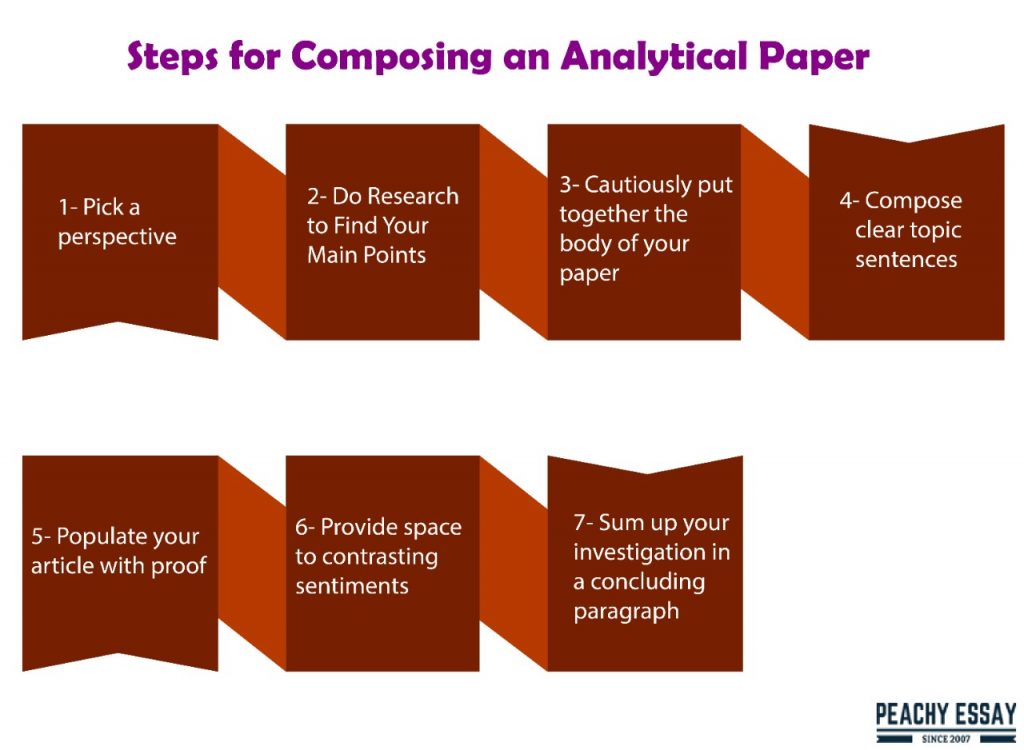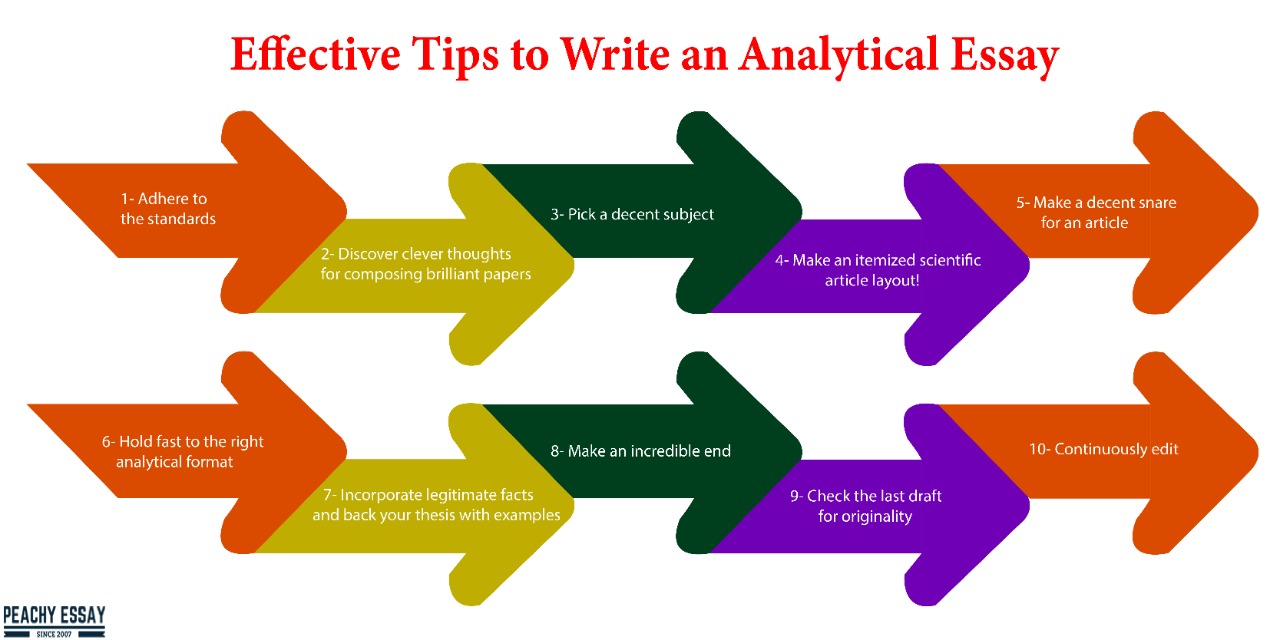Analytical essay give an approach to share your experiences about a work of writing, scientific research or chronicled occasion. In this guide, you will get in-depth information on the best ways to compose an analytical essay.
What is an Analytical Essay?
An analytical essay is a piece of composing that gives a considerable investigation of a theme. Analytical papers can be expounded on craftsmanship, music, artistic works, recent developments, chronicled occasions, governmental issues, logical examination, and reasoning, etc. These articles are regular in scholastic settings, and they likewise show up in magazines, papers, and journals. A decent analytical essay can clarify and contextualize essential data to assist a reader.
What is the Purpose of an Analytical Essay?
Analytical essays are meant to serve two needs, one for the reader and one for the author. Secondary teachers and school educators assign analytical papers to assist their understudies in developing as authors and scholars. Analytical essays help an understudy’s composing abilities and upgrade their cognizance of a specific subject.
Analytical articles likewise, can benefit readers. Papers and magazines regularly publish basic examination expositions to help their readers figure out the information on the day. These sorts of expositions empower creators, who might be specialists in their fields, to instruct their compatriot on governmental issues, financial aspects, workmanship, engineering, culture, and numerous different subjects of significance.
Step-by-Step Guide for Composing an Analytical Essay
The best analytical articles offer an unmistakable perspective, are efficient around the principle thought, address restricting contentions, and are completely upheld by essential and optional sources.
Here are the steps for composing an analytical paper.

Pick a perspective
Regardless of what you pick as your point of view, you should plan to anchor your whole analytical article around a particular thesis statement.
Compose an introductory paragraph, and let end with a thesis statement. A fantastic introduction can draw your readers’ attention, so take additional consideration of your initial section. The best introductions start with a snare like a non-serious inquiry or a strong assertion and give a worldwide setting, laying out questions that your examination will handle. A decent introduction closes with a thesis statement that acts as a basis for the whole article.
Do Research to Find Your Main Points
This is the place where you decide the main part of your examination – the data that makes your exposition an insightful article. You may list each thought that you consider and then research every one of those and utilize the three or four most grounded ones for your exposition. Inferior points are those that don’t relate back to the thesis, that you don’t have a lot of investigation to talk about, or that you can’t find genuine examples for. A decent general guideline is to have one body section for every primary idea.
Cautiously put together the body of your paper
After your initial section, partition your article into body paragraphs that dig into explicit subjects. All body sections should serve the primary objective of supporting your thesis statement, either by giving background data, delving into subtleties, or giving divergent perspectives. The number of body paragraphs will vary contingent upon the extent of your exposition. The construction of your article is similarly pretty much as significant as the subject of your paper, so set aside the effort to design each body passage.
Compose clear topic sentences
Every principle body passage should start with a topic sentence that both presents the subject of the particular section and binds it to your primary proposal.
Populate your article with proof
The primary body of the article ought to be loaded up with a combination of substance and examination. You will not persuade your audience by offering expressions without strong proof to back them up. Subsequently, you should uphold the central matters of your investigation with literary proof taken from both essential and optional sources. Use references and endnotes as part of your proof.
Provide space to contrasting sentiments
You can make a contention more grounded by recognizing another perspective. Regardless of whether you disagree with a basic viewpoint, you can, in any case, utilize a body passage to express that perspective. You would then be able to discredit that contention with extra proof and thinking, reinforcing your theory.
Sum up your investigation in a concluding paragraph
Regardless of whether you’re focusing on a passing mark, or merely attempting to give your audience a delightful reading encounter, wrap up your analytical article with a finishing up a passage that recaps your contention. The closing section isn’t the spot to present new proof. Or maybe, it is the bow on your whole exposition, helping your reader to remember your most significant points and leaving them with some final words for thought.
Analytical Essay Outline
To compose a powerful analytical exposition, you ought to coordinate the design of the paper to make the whole writing process simpler. It is prescribed to have up to five sections on your paper layout.
Here is the analytical essay outline.
Introduction
- Orientate the reader
- Recognize the reason
- Outline the scope
- Highlight the thesis
Body
- Subject sentence 1
- Supporting subtleties
- Closing sentence 1
- Subject sentence 2
- Supporting subtleties
- Closing sentence 2
- Subject sentence 3
- Supporting subtleties
- Closing sentence 3
Conclusion
- Rehash the thesis statement
- Sum up the contention
What’s the Difference between an Analytical Essay and a Descriptive Essay?
What separates an analytical paper from a descriptive article is the writer’s perspective. While analytical expositions present a contention upheld by proof, descriptive papers will, in general, appear as book outlines, film summations, spellbinding articles, and useful flyers that do exclude analysis or assessment. Like a decent scientific exposition, a solid analytical article will feature its central matters, sort out given points into body passages, and utilize legitimate changes. Descriptive articles sum up realities, while analytical papers dig into understanding.
Analytical Essay Structure
Analytical expositions are organized likewise to numerous different articles you’ve composed, with an introduction, a few body sections, and a conclusion. The following is a blueprint you can follow while organizing your paper.
Introduction
Begin with good background data, and use a snare to make your paper effective. For the snare to have a solid impact, it ought to be intriguing and astonishing enough to catch the reader’s eye.
A hook comprises one to two sentences intended to catch the reader’s eye from the initial lines of the analytical paper. The choice of a hook relies upon the disposition of the work and furthermore, the target group.
A hook can be any of the following:
A fun joke,
Demonstrated reality,
Shaking statistics,
Rhetorical questions,
Statement of a well-known individual,
There is no particular format for the introduction, yet background data is the most well-known strategy for approaching the making, and you ought to give data pertinent to your proposal. This data should begin expansive and slender towards the thesis—while staying significant.
Body Paragraphs
Your analytical article will commonly have three or four body passages, each covering a different point of analysis. Start each body passage with a sentence that sets up the primary concern you’ll be examining. At that point, you’ll give some analysis, backing it up with proof to help your case. Keep dissecting and giving proof for your analysis until you’re out of solid points for the subject.
Body sections will include the following:
- Subject Sentence: Introduce the primary concern of the body passage in one direct and viable sentence.
- Analysis: Analyze your supporting proof. Clarify how the proof backs your thesis statement. This part should take up around a couple of sentences and is seemingly the main piece of the whole scientific exposition composing.
- Proof: The analysis is made from the supporting proof that you discover (realities, statistics, etc.), so they should consistently go inseparably. Ensure that these two sections connect together in a clear way.
- Closing Sentence: Restate to the reader your analysis and its importance forthright nearby.
Conclusion
The end ties up the whole paper. Begin by rehashing your thesis statement. The meaning of this is to represent to your audience that you have demonstrated the thesis statement and to sum up the steps you took. Likewise, the end can assist the reader with understanding your considerations and their association into a cohesive piece.
It is imperative to make smooth progress from the body passages to the end. Try not to leap to it excessively fast, as it might interfere with the progression of your paper. The ideal approach to remind the reader about your thesis statement is to reword it. Then, you need to sum up the primary concerns of body sections by using the main facts.
To end the whole paper, it’s important to make an overall concluding statement. This can be either what you have gained from composing the paper, or what the audience should detract from your work.
Analytical Essay Topics and Ideas
There are countless different points that can be dissected in your analytic paper. Simply think about any sort of thought, certainty, or idea: you can make the associations practically from anything and concoct realities to help them.
Here are the analytical essay topics classified according to categories.
Social Problems Essay Topics
Family establishment: Does single nurturing impact kids’ mental prosperity?
Is inequality an unavoidable factor?
What are the upsides and downsides of computer games for kids?
Could individuals keep up their social personality in the current multicultural society?
For what reason do athletes will, in general, utilize doping?
Occupation Essay Topics
What is the significance of cooperation in the working environment?
What sort of association can be named effective?
How might organizations improve work fulfilment among representatives?
What makes pioneers compelling?
What impact does the gender pay gap have on ladies?
Political Essay Topics
Does patriotism make the world a protected spot?
Is the figure of Karl Marx still applicable these days?
Would democracy be able to be viewed as an oppression of the larger part?
Are unfamiliar non-political entertainers oblige to help the democratization of different nations?
For what reason is patriotism progressively developing?
Character Essay Topics
What are the reasons for betting fixation?
For what reason are a few young people more inclined to peer pressure than others?
For what reason are the adolescents inclined to substance misuse?
What is the association between one’s character and his/her childhood?
Does birth order affect how individuals decide?
School Essay Topics
Should kids in grade schools wear uniforms?
Should sex training be instructed at school?
Should schooling costs be dropped?
Does advanced education decidedly influence the ways of life?
How might school specialists tackle harassing?
How could instructive principles in the USA be improved?
Can a public secondary school instructive program improve learning guidelines?
Health Essay Topics
Should the Americans be given a compensation to purchase less expensive conventional medications past the domain of the USA?
Could general wellbeing inclusion be demonstrated effective?
Should there be set up a price control on drugs?
How might wellbeing specialists create associations with partners?
Should drug organizations be forcefully made to unveil their estimating procedures and the expense of creation?
Tips for Writing an Excellent Analytical Essay
Composing such work comprises of a wide range of steps, every one of which matters and can either assist you with succeeding or failing. Here are how to do it right.

Adhere to the standards
When in doubt, your instructor or college ought to have a rule for scholastic composing that ought to contain the principle rules and prerequisites – ensure you peruse and comprehend them to avoid errors.
Discover clever thoughts for composing brilliant papers
Conceptualizing can be the most complex piece of the creative cycle, yet it is doubtful to maintain a strategic distance from it – you need to produce enough thoughts and models for your content before you begin composing it.
Pick a decent subject
The subject must be significant, drawing in, new, and significant. It likewise ought not to be too wide or restricted; here are a couple of models:
For what reason do we have short and long haul memory?
For what reason do youths need protein?
For what reason do young people act a specific way?
Why are some European nations like Greece in such a financial crisis?
Make an itemized scientific article layout!
It is highly unlikely you can compose a decent paper without having a decent article plan – it should help you perceive how it will look, characterize what ought to be missed and what else must be incorporated to make your paper look coherent and complete.
Make a decent snare for an article
In the event that you are pondering “how to begin an exposition?” the appropriate response is – make a snappy snare to command the notice of your reader and make the person in question need to peruse your content as far as possible. A decent presentation consistently begins with a drawing hook – it very well may be an intriguing reality, quote, facetious inquiry, factual information, joke, or different things that can intrigue your readers. At that point, you need to make a thesis statement. A thesis is a short explanation that normally contains the primary assumptions about the paper results or a particular certainty that you will demonstrate or contend with. Remember that the introduction is quite possibly the main piece of your work, and in the event that it isn’t adequately amazing, your audience will get exhausted, and you won’t get a high evaluation!
Hold fast to the right analytical format
In any scholarly paper, it is essential to structure the function admirably. On account of an article, your design should comprise a concise introduction, a body, and a conclusion (one section that contains the outcomes and repeats your postulation). With respect to the organization, it ought to be characterized by your instructor. If not, the best choice is to locate a top-notch logical exposition guide to have a thought of how it should look like eventually.
Incorporate legitimate facts and back your thesis with examples
Substantial contentions, realities, and models are the critical segments of your content – you can take an example from a book, logical work, history, or even your life yet guarantee that it is clear and pertinent to your subject.
Make an incredible end
Your synopsis ought not to be less powerful than an acquaintance – it has to be brief, directly forthright, sensible, and furthermore captivating. It ought to close the fundamental thoughts of your content, incorporate outcomes, and repeat your proposition – search for a decent example end to try not to commit normal errors.
Check the last draft for originality
Inventiveness is the principal prerequisite of any paper, and you need to guarantee that your exposition has negligible hints of copyright infringement otherwise, your evaluation can be a lot lower.
Continuously edit
This is evident counsel however, you ought to keep in mind the significance of editing and altering – this is how you can clean your paper and guarantee it meets all necessities.


